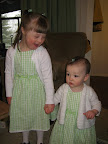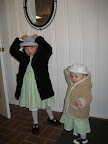I haven't read
Jennifer Weiner since
Good in Bed. And, while I enjoyed the novel very much, I still haven't forgiven her for it. My lingering anger, plus the nastiness of the scene from
In Her Shoes included at the back of my paperback copy of
Good in Bed as a teaser for her second novel, put me off her work for a while.
Have you read
Good in Bed? If you have, you probably remember that the main character is fat. I mean, really fat. Fat like she takes up more than her fair share of the seat on public transportation and people sneer at her. Fat like she goes to a physician for necessary medical weight loss assistance. Fat like people make comments, and she rarely gets dates, and when she does get a first via the internet, she never gets asked back for a second date.
The author goes on and on and on in this vein, and she does have some interesting things to say about being a fat young woman in America, taking care to show that it's not just how the character feels, but that her fatness is an objective state, noted by all. Then Weiner chickens out (because, like many of her characters, Cannie is loosely modeled on herself) and has the character tell us that that she's a size 14. 14! The size of the average American woman! So fat that everyone stares, that it's a given that she needs urgent medical help, that she oozes over onto neighboring bus seats. Whatever. I lost a lot of respect for Weiner over the weight thing, as she further reinforced harmful cultural weight attitudes.
(For the record, when I'm thin and fit enough to feel proud of my body, and a few people are quietly asking if I've been ill, or if I have an eating disorder, I am a size 10-12. That's what you get when have a 12-0-12 figure like mine; you'll never be a size 2. Currently, I am
not thin and fit. I am wearing size 16 jeans, and I do not ooze anywhere, thankyouverymuch. I fit just fine in airplane seats and I am not in need of medical intervention, just a bit more exercise.)
I know that Weiner is a good writer and storyteller, but I just never got around to picking up another of her books (or seeing that movie with Cameron Diaz) until this weekend, when I gobbled up
The Guy Not Taken, a collection of short stories by Weiner.
They're good, and they deal heavily with two main themes: divorce and the difficulties of being a mother to a very young child.
Weiner describes
The Mother's Hour as being "as close to a horror story as I'll ever come," a good description of one of the scariest stories I've read in a long time. It's well-written and, like many of the stories, touches on some important issues, in this case ageism and, especially, classism. And motherhood and divorce.
This line, in particular, really resonated with me:
She had, she realized, gotten out of the habit of loving him during the first few years of their daughter's life, when every minute of every day was a struggle, and while she'd learned to get along with him, she'd never learned to love him again. Paul and I have spent a lot of time and money on therapy and on making sure that this doesn't happen with us, but I understand the sentiment oh so very well. It's so easy to focus on just getting through the days, just waiting for bedtime, for a little peace and quiet, for a moment to ourselves, for an end to the battles over diapers and potties and vegetables and indoor voices.
People always say, "It goes by so fast." And we hear, "Just hold on, it will pass." But what they're also really saying is, "Live in these moments. Try to enjoy them, feel them, experience them, share them, don't just endure them. Don't just look ahead to the next thing."
This is it. This is life. And there's no use waiting for it to get better: make a life of this collection of experiences you're living, no matter how difficult it seems. (Although, sometimes, I really do look forward to being able to tell the kids that I'm running out to Borders; please call me on my mobile if anything comes up and they need me.)














